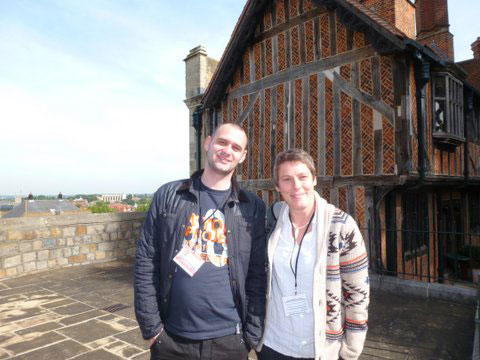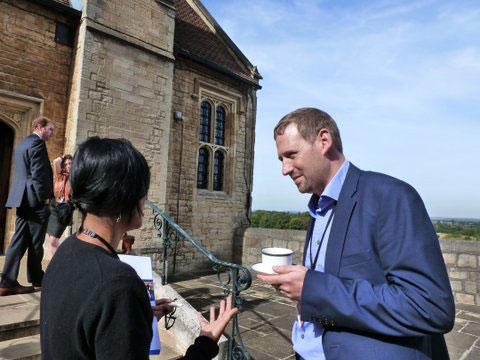A sample of earlier work is outlined here, showing some of the ways in which the founder’s intentions have been pursued since the establishment of the Foundation in 1971.
Wigan Comino Centre – this was established in 1999 in association with the Wigan Education Business Partnership, which had developed an approach called Classrooms in Companies. Supported by Comino funding for over ten years, the Centre helped to develop these innovative classrooms. More than ten Classrooms in Companies were established with sponsorship from organisations representing utilities, sport, farming, local government, construction and the environment.
Each Classroom in Company was located outside school and within a company. They offered a unique learning experience, with activities designed to develop skills linked to creativity, enterprise and employability delivered by staff from industry and education, working in partnership. When the Classrooms in Companies were fully established, 15,000 young people were visiting them on an annual basis – each visit typically lasting for one day. Company staff were trained in using Dimitri Comino’s GRASP process, in order to help young people to translate their learning experience into “getting results” in other areas of their lives.
Over the years, Classrooms in Companies became the test bed for numerous educational initiatives that influenced both local and national policies. They won several awards and, in May 2010, Her Majesty Queen Elizabeth II opened a Classroom sponsored by Leigh Centurions Rugby League Football Club.
Comino Centre for Science Education at Sheffield Hallam University – this Centre developed a range of ways in which children can be helped to develop generic personal skills and capabilities, such as teamwork, self -management, creativity, communication, problem solving, tenacity and a positive self-image. Designed to take place in the mainstream STEM curriculum, this work was supported by research which demonstrated how young people, even at primary school stage, can learn to observe and identify the personal capabilities they are developing. Encouraging children to engage in various forms of self and peer review prompts them into growing self-awareness that helps them become more responsible for their learning. Some of this work was developed in partnership with Huthwaite International, using the approach Verbal Behaviour Analysis which Huthwaite pioneered for use in business. In 2007, the Comino Foundation also funded the Sheffield Comino Centre to develop a qualification in leadership, based in the STEM curriculum, which became the EdExcel Leadership Qualification at BTEC levels 1 and 2. This STEM Leadership qualification was launched in September 2008 with several centres being established to train teachers to deliver the qualification in secondary schools and academies.
When the Winchester Comino Centre – now known as the Centre for Real World Learning – was first established at King Alfred’s College, Winchester, it worked on a number of government funded projects, including Enterprise Awareness in Teacher Education. It also contributed to the work which led to the College achieving university status in 2005.
The PACE Centre (Positive Achievement inspired by the principles of Conductive Education) established in 1990 in Aylesbury, Buckinghamshire is a leading institution for conductive education. From 1997 to 2009 the Comino Foundation provided funding to enable PACE to expand and to train representatives from other institutions to use conductive education both in the UK and internationally. In its partnership with the Foundation, PACE developed innovative approaches to learning designed to improve the development of children with motor disorders, such as cerebral palsy, developing effective training programmes for staff, which combined practical know-how with programmes in the theory and practice of conductive education.
The Ideas Foundation was established in 2003 by Robin Wight, then President of the communications agency, The Engine Group. It aimed to inspire young people by giving them a chance to work on real-life marketing briefs with leading figures in the creative industries and thus to encourage greater diversity in the creative industries. Sir Mike Tomlinson, then a Comino trustee, and Chairman of the Learning Trust for Education in Hackney, introduced Comino to the Ideas Foundation. The Comino Foundation recognised that its aims and approach were in line with its own and decided to support the initial stages of this work, which was based solely in London. The two foundations maintained a close working relationship, with Comino supporting the Ideas Foundation to collaborate with the North West Comino Creative Consortium of schools, whose work is outlined on the Social Opportunity page of this website.
Local Solutions, a Liverpool-based charity, has been working in the field of youth homelessness since 1986, providing a range of accommodation and support services across the North West. By 2009, it seemed that many of the young people they helped did not make progress out of homelessness, despite accessing numerous services and engaging with significant numbers of professionals. Instead, they continued to move between various short-term accommodation options. Determined to break this cycle, in 2009, with funding from the Comino Foundation, Local Solutions established the Intense Mentoring service. Designed to support these young people and help them to move out of dependency, this mentoring service aimed to break the cycle of exclusion by delivering intense and sustained one-to-one support, helping vulnerable young people to reach a position of independence that includes stable relationships, accommodation, training and employment. Additional elements of the service were also supported by other trusts, enabling some personal development activities to be offered in addition to one-to-one mentoring.
On 5/6th September 2012, a 24-hour consultation, hosted by the Comino Foundation, was held at St George’s House, Windsor Castle. The purposes of the consultation were:
- to share with participants the outcomes of a particular approach to working with young homeless people in one local context – Liverpool
- to invite participants to set this work alongside other similar ventures and identify significant common features in the approaches used
- to provide an opportunity for participants to consider together any wider implications for practice, policy and funding
- to establish networks of organisations using comparable approaches, to share practice and to accelerate change in delivering effective models of support.
The Lankelly Chase Foundation also supported this work.
Download a full report of the consultation here



(Above) Participants in the consultation at St George’s House, Windsor Castle, October 2012.
The Local Solutions work continues